

How strained US-China relations are playing out in American universities. Last November, in the dead of night, dozens of paint-wielding students descended into a concrete tunnel.
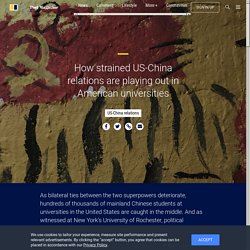
They were decked out all in black, faces hidden behind surgical masks. Everyone had been advised to remove any identifying markers, tell a trusted friend where they were headed, and leave their phones behind to avoid being tracked. They scrawled messages such as “Re-education camps are prisons”, “We are all Hongkongers”, and “Save Tibet, our people are burning”. Then, in the red and yellow of the Chinese flag on the tunnel entrance, “CENSOR THIS”. It was the third such paint job in as many days at the University of Rochester, in New York state. China Warns of Latest National Security Threat: ‘Sea Turtles’ - China Real Time Report. Chinese state media sent a clear warning message this week: as the number of young people studying abroad rises, so, too, do risks to the country's national security.
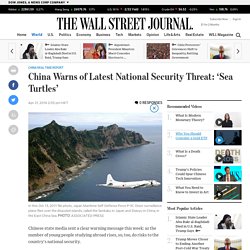
On Wednesday night, state broadcaster CCTV reported that a young man who had studied abroad in an unnamed country had been caught in 2013 taking photos of a military complex in the eastern Chinese city of Ningbo. Chinese students who have returned from studying abroad are typically called haigui, or "sea turtles," in Mandarin. The broadcaster said the man, named Chen Wei, had assisted a foreign contact in helping track the movement of Chinese coast guard boats and other vessels patrolling a disputed island chain in the East China Sea. The islands are controlled by Japan, which calls them the Senkaku Islands. But they are also claimed by China, which has its own name for them, the Diaoyu Islands. "The year 2013 was the most sensitive time for the situation around the Diaoyu Islands," CCTV said.
Mr. It wasn’t clear why Mr. College Daily, the “Post-Truth” Publication Where Chinese Students in America Get Their News. On a Monday morning in February, members of the staff of College Daily, an online Chinese-language publication for Chinese students living in North America, gathered in their office, in Times Square, for an editorial meeting.
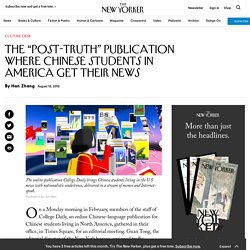
Guan Tong, the editorial director of the New York bureau, reviewed traffic numbers from the previous week. Staring at her MacBook, she seemed satisfied with what she saw. A piece by College Daily’s founder, Lin Guoyu, about the blockbuster Chinese movie “The Wandering Earth,” had garnered more than a million page views; its headline was “Of Course, Only Chinese People Can Save Planet Earth.” The healthy numbers came as a surprise: it was Lunar New Year, which tends to be a slow week for College Daily. “No need to worry about low traffic during Lunar New Year anymore,” Guan said cheerily. “Everyone has been studying He-he’s style,” Guan told the group.
China moves to suspend some history tests for U.S. college credit by 2020 - Reuters. BEIJING (Reuters) - Beijing on Thursday ordered a suspension of history exams run by a U.S. non-profit for students seeking credit at American colleges, as the ruling Communist Party cracks down on educational material it deems unfriendly.
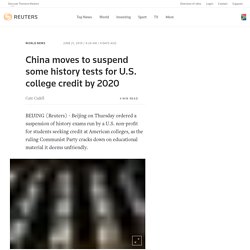
The suspension of Advanced Placement (AP) tests will hit secondary school students looking to ease the academic workload at U.S. universities by earning credit for some college courses, enabling them to graduate faster. Five testing centres across the cities of Beijing, Guangzhou, Nanjing and Shanghai confirmed to Reuters that they would suspend the tests by 2020, after a directive from China’s education ministry. “This is a bit sudden, we don’t know the reason,” a Nanjing-based centre, SAT Test Web, said in a posting on social media site WeChat.
“If you apply for any of these four subjects, it means you need to go to other exams outside the mainland.” The tests affected are in U.S. The move also comes amid rising U.S. The World’s Lamest Trojan Horse. Why China’s overseas students find things aren’t always better back home. Having obtained a dual bachelor’s degree from a US university and climbed to a senior software engineer’s position within two and a half years of working for an American company, Owen Wang was forced to dramatically scale back his salary expectations when he decided to come home to China.
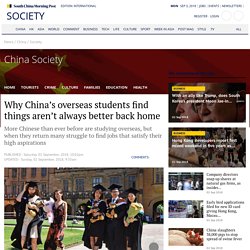
Currently working in Kansas City – where the average annual senior software engineer’s salary is US$100,000, according to glassdoor.com – the best offer from a Chinese firm he has received so far is a package from a Shenzhen-based start-up worth around 240,000 yuan (US$35,250). But while he had expected salaries in the southern Chinese city to be lower than those on offer in the US – the per capita income in Kansas City is over four times more than the average in Shenzhen – he had been hoping someone would offer him a pay packet worth around 500,000 yuan a year.
“We’re still negotiating. “Many of the students are sent abroad because their parents can afford it.
Scmp. Why So Many Chinese Students Come to the U.S. Patriotic Chinese writer draws ire after trying to enroll her kid at an American school - SupChina. Yuan Xiaoliang, from her Weibo account Yuan Xiaoliang 袁小靓 made a name for herself by bashing democracy.
